The Surf Punks were a pop punk band formed in 1976 by Malibu residents Dennis Dragon (1947-2017) and Drew Steele. Dragon recruited the additional talents of Malibu residents Tony Creed AKA the "Hulk", for lead guitar and blues harp, fellow bodysurfer/frisbeeist John Hunt on the bass, and South Bay resident John Heussenstamm for lead guitar. This was the original core group, produced and engineered by Dragon in his garage studio across the street from Zuma Beach, his favorite body surfing spot. Mark Miller joined them on "Locals Only." Jeff "Ray Ban" Eyrich joined the Surf Punks on bass when John Hunt left the group.

Gidget is a 1959 American CinemaScope comedy film directed by directed by Paul Wendkos and starring Sandra Dee, Cliff Robertson, James Darren, Arthur O'Connell, and the Four Preps.

Psycho Beach Party is a 2000 comedy horror film based on the off-Broadway play of the same name, directed by Robert Lee King. Charles Busch wrote both the original play and the screenplay. As the title suggests, Psycho Beach Party, set in 1962 Malibu Beach, is a parody of 1950s psychodramas, 1960s beach movies, and 1980s slasher films.
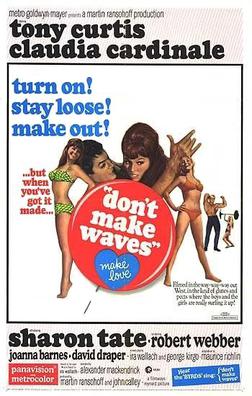
Don't Make Waves is a 1967 American sex comedy starring Tony Curtis, Claudia Cardinale, Dave Draper and Sharon Tate. Distributed by Metro-Goldwyn-Mayer, the film was directed by Alexander Mackendrick and is based on the 1959 novel Muscle Beach by Ira Wallach, who also co-wrote the screenplay.

Back to the Beach is a 1987 American comedy film starring Frankie Avalon and Annette Funicello, directed by Lyndall Hobbs. The original music score is composed by Steve Dorff. The film generated a total domestic gross of $13,110,903. It received a "two thumbs up" rating from Siskel and Ebert, who compared it favorably to Grease.

The beach party film is an American film genre of feature films which were produced and released between 1963 and 1968, created by American International Pictures (AIP), beginning with their surprise hit, Beach Party, in July 1963. With this film, AIP is credited with creating the genre. In addition to the AIP films, several contributions to the genre were produced and released by major and independent studios alike. According to various sources, the genre comprises over 30 films, with the lower-budget AIP films being the most profitable.
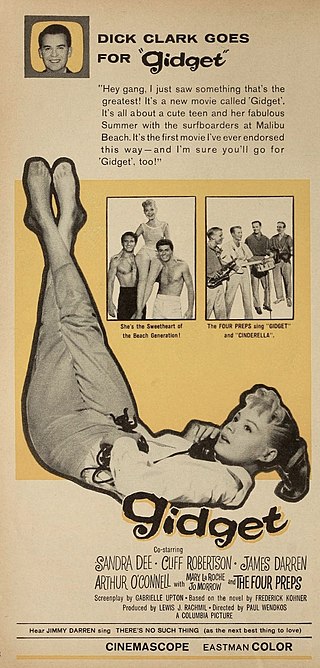
Surf movies fall into three distinct genres:
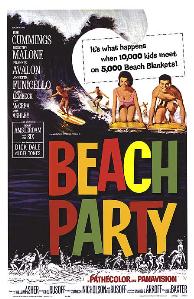
Beach Party is a 1963 American film and the first of seven beach party films from American International Pictures (AIP) aimed at a teen audience. This film is often credited with creating the beach party film genre.
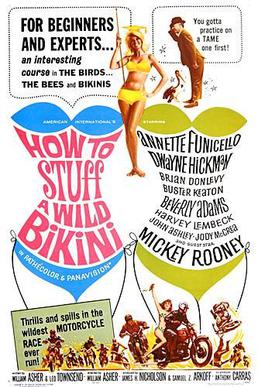
How to Stuff a Wild Bikini is a 1965 Pathécolor beach party film from American International Pictures. The sixth entry in a seven-film series, the movie was directed by William Asher and features Mickey Rooney, Annette Funicello, Dwayne Hickman, Brian Donlevy, and Beverly Adams. It was written by Asher and Leo Townsend. The film features a brief appearance by Frankie Avalon and includes Buster Keaton in one of his last roles.

Ski Party is a 1965 American teen musical comedy film directed by Alan Rafkin and starring Frankie Avalon and Dwayne Hickman. It was released by American International Pictures (AIP). Ski Party is considered as a beach party film spin-off, with a change of setting from the beach to the ski slopes – although the final scene places everyone back at the beach.

Muscle Beach Party is the second of seven beach party films produced by American International Pictures. It stars Frankie Avalon and Annette Funicello and was directed by William Asher, who also directed four other films in this series.

It's a Bikini World is a 1967 American musical comedy film starring Tommy Kirk, Deborah Walley and Bobby Pickett. The film features cameos by the music groups the Gentrys, the Animals, Pat & Lolly Vegas, the Castaways and R&B girl group the Toys. Featuring a pro-feminist plotline, it is the only film in the beach party genre to be directed by a woman.
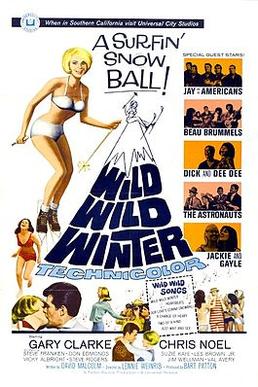
Wild Wild Winter is a 1966 Universal Pictures beach party comedy film directed by standup comedian Lennie Weinrib and starring Gary Clarke and Chris Noel. It was produced by Bart Patton and is notable for featuring Jay and the Americans and the duo of Dick and Dee Dee in their only film appearances. The Beau Brummels, Jackie and Gayle and The Astronauts also perform onscreen.
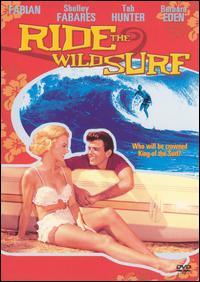
Ride the Wild Surf is a 1964 American romantic drama film. It was filmed in 1963 and distributed in 1964. Unlike the beach party movies of the era, this was a departure from the typical Hollywood approach to surfing as it was a drama, not a comedy. It is known for its exceptional big wave surf footage – a common sight in surf movies of the time, but a rarity in Hollywood films. Likewise, the film has only one pop song – the titular Jan and Dean track, which is heard once, at the end of the film.

The Beach Girls and the Monster is a horror and beach party film, released in 1965, directed by and starring Jon Hall. It is notable for its surf music instrumental soundtrack, bad acting, and not-very-terrifying-monster.
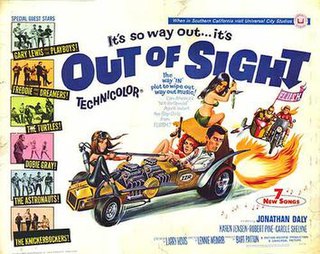
Out of Sight is a 1966 comedy film with elements of the spy spoof. It is the third and last of a series of films geared at teenagers by director Lennie Weinrib and producer Bart Patton for Universal Pictures. Patton called it "an over the top kind of thing".

Wild on the Beach is a 1965 beach party film directed by Maury Dexter and starring Frankie Randall, Sherry Jackson, Gayle Caldwell, and Jackie Miller. It is notable for the musical acts showcased onscreen, being the film debut of Sonny & Cher in particular. It is one of the few films in the genre to be filmed in black and white.

Summer Surf is the fifth studio album of surf music by Dick Dale and His Del-Tones. Dale wrote three of the tracks on the album, with Beach Boys' session musician Steve Douglas writing another three. The rest are culled from various writers that were not necessarily writing in the classic surf style. For example, the track titled "Glory Wave," written in the style of a spiritual, was originally written for the 1964 beach party film, Surf Party, where it was performed by Jackie DeShannon. This was the last album Dick Dale recorded with the Del-Tones due to his battle with rectal cancer, and the last album he would record until 1986.

Beach Ball is a 1965 American beach party movie starring Edd Byrnes and partly financed by Roger Corman.
The Del-Aires were a Paterson, New Jersey rock band of the 1960s. They were featured as themselves in Del Tenney's 1964 B-movie beach party film, The Horror of Party Beach. For the film, Gary Robert Jones and Ronnie Linares wrote one song together, "Drag", and one song each: "Just Wigglin' 'n' Wobblin'" (Jones) and "Elaine" (Linares). The Del-Aires performed all six songs in the film, which included "Joy Ride", "The Zombie Stomp" and "You Are Not a Summer Love." Following his stint with the Del-Aires, saxophonist/guitarist/keyboardist Bobby Osborne was a member of the band Gas Mask, perhaps best known for having their first album, Their First Album, produced by Teo Macero.


















